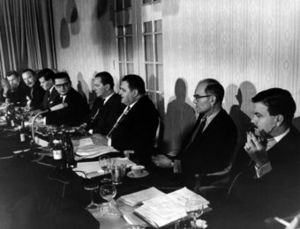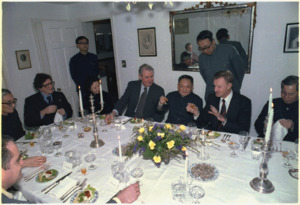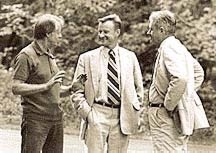Zbigniew Brzezinski facts for kids
Quick facts for kids
Zbigniew Brzezinski
|
|
|---|---|
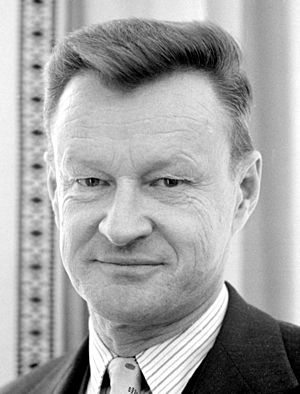
Brzezinski in 1977
|
|
| 9th United States National Security Advisor | |
| In office January 20, 1977 – January 20, 1981 |
|
| President | Jimmy Carter |
| Deputy | David L. Aaron |
| Preceded by | Brent Scowcroft |
| Succeeded by | Richard V. Allen |
| Personal details | |
| Born |
Zbigniew Kazimierz Brzeziński
March 28, 1928 Warsaw, Poland |
| Died | May 26, 2017 (aged 89) Falls Church, Virginia, U.S. |
| Political party | Democratic |
| Spouse | |
| Children |
|
| Parents |
|
| Relatives | Matthew Brzezinski (nephew) |
| Education |
|
Zbigniew Kazimierz Brzeziński (March 28, 1928 – May 26, 2017), also known as Zbig, was a Polish-American diplomat and political scientist. He helped advise President Lyndon B. Johnson from 1966 to 1968. Later, he became President Jimmy Carter's top foreign policy advisor, the National Security Advisor, from 1977 to 1981.
Brzezinski was known for his strong views on international relations. He believed in a "realist" approach, focusing on power and security between countries. He also helped create The Trilateral Commission, a group that aimed to improve cooperation between North America, Europe, and Japan.
During his time as National Security Advisor, many important events happened. These included:
- Making relations normal with China.
- Signing a major arms control treaty (SALT II) with the Soviet Union.
- Helping to create the Camp David Accords peace treaty between Egypt and Israel.
- The start of the Iranian Revolution.
- Supporting people who wanted freedom in Eastern Europe.
- Helping Afghan fighters against the Soviet Union during the Soviet–Afghan War.
- Giving control of the Panama Canal back to Panama.
People described Brzezinski's views as "progressive" and "international." He was a strong opponent of communism. He believed in protecting human rights and making Western countries strong.
Brzezinski also taught at Johns Hopkins University. He often appeared on TV as an expert on world events. His daughter, Mika Brzezinski, is a well-known TV news anchor. His sons, Ian and Mark, also became experts in foreign policy.
Contents
- Early Life and Moving to America
- Studying and Teaching About the World
- The Trilateral Commission
- Working in Government
- National Security Advisor Role
- Key Policies and Ideas
- After Leaving Office
- Later Years and Legacy
- Family Life
- Public Roles
- Film Appearances
- Death
- Honors and Awards
- Books by Brzezinski
- See also
Early Life and Moving to America
Zbigniew Brzezinski was born in Warsaw, Poland, on March 28, 1928. His family was Roman Catholic and came from a town called Brzeżany. This town is likely where their family name came from.
His father, Tadeusz Brzeziński, was a Polish diplomat. From 1931 to 1935, Zbigniew lived in Germany and saw the rise of the Nazis. Later, his father was posted to the Soviet Union during a time when many people were arrested or killed. His father was also praised for helping Jewish people escape the Nazis.
In 1938, his family moved to Montreal, Canada. A year later, Nazi Germany and the Soviet Union invaded Poland. After World War II, Poland came under Soviet influence. These events deeply affected Brzezinski. He said that the violence against Poland made him realize that world politics is a "fundamental struggle."
Studying and Teaching About the World
After high school, Brzezinski went to McGill University in Montreal. He earned his Bachelor's and Master's degrees there. His Master's thesis focused on the different groups of people within the Soviet Union.
He then went to Harvard University for his PhD. He studied the Soviet Union and how it changed after the October Revolution. He earned his PhD in 1953.
From 1953 to 1960, Brzezinski taught at Harvard University. He then moved to Columbia University in 1960. There, he led the Institute on Communist Affairs until 1972. He later became a professor at Johns Hopkins University.
- Ideas on the Soviet Union: As a professor, Brzezinski believed that Eastern European countries could slowly resist Soviet control. He called his ideas "peaceful engagement." He became an American citizen in 1958.
- Mentoring Future Leaders: At Columbia, he wrote a book about Eastern Europe during the Cold War. He also taught Madeleine Albright, who later became a Secretary of State.
- Predicting Changes: Brzezinski believed the Soviet Union was becoming weaker. He predicted it would eventually break apart because of its many different nationalities. He also thought the Soviet system couldn't keep up with new technology.
Brzezinski continued to support peaceful talks with Eastern European governments. He also supported the Vietnam War. In 1966, he joined the U.S. Department of State's Policy Planning Council. He helped shape President Johnson's "Bridge Building" speech, which aimed to improve relations. In 1968, he left the council because he disagreed with the expansion of the Vietnam War.
The Trilateral Commission
In 1970, Brzezinski wrote a book called Between Two Ages. In it, he argued that developed countries needed to work together. This cooperation would help deal with global problems like economic inequality.
Because of this idea, Brzezinski co-founded The Trilateral Commission in 1973 with David Rockefeller. He was its director until 1976. This group brought together important political and business leaders from the United States, Western Europe, and Japan. Their goal was to strengthen ties between these three powerful regions. In 1974, Brzezinski invited Georgia Governor Jimmy Carter to join the commission.
Working in Government
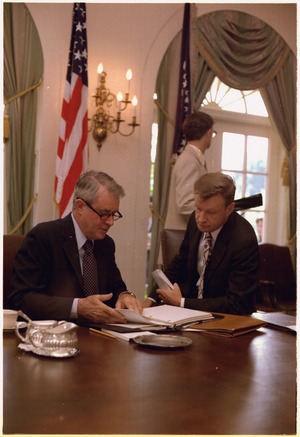
Jimmy Carter announced he would run for president in 1976. He said he was an "eager student" of Brzezinski. Brzezinski became Carter's main foreign policy advisor by late 1975. He was critical of the previous policy of "détente," which he felt favored the Soviet Union. Instead, he supported the Helsinki Accords, which focused on human rights and peaceful engagement.
After Carter won the election in 1976, he made Brzezinski his National Security Advisor. Brzezinski immediately started focusing on human rights. He believed this would challenge the Soviet Union.
- Disagreements with Vance: Brzezinski often disagreed with Secretary of State Cyrus Vance. Vance wanted to focus on arms control with the Soviets. Brzezinski believed the Soviets were becoming too bold and wanted to increase military strength and emphasize human rights.
- Radio Free Europe: Brzezinski ordered Radio Free Europe to broadcast more powerfully. This was a big change from earlier policies. Some European leaders, like West German Chancellor Helmut Schmidt, did not like this.
- Poland Visit: Brzezinski visited Warsaw, Poland, and met with Cardinal Stefan Wyszynski. He saw the Roman Catholic Church as a key group opposing communist rule in Poland.
In 1978, Brzezinski advised Carter to build relations with the People's Republic of China. He traveled to Beijing to prepare for this. This led to the United States officially recognizing China and ending ties with Taiwan.
- Key Events of 1979: Two major events happened in 1979: the Iranian Revolution and the Soviet invasion of Afghanistan. The Iranian Revolution led to the Iran hostage crisis. Brzezinski expected the Soviet invasion of Afghanistan. He worked with Saudi Arabia, Pakistan, and China to weaken the Soviet presence there.
- Nuclear Scare: On November 9, 1979, Brzezinski received a terrifying call. He was told that 250 nuclear weapons had been launched at the United States. Minutes later, the number changed to 2,000. As he prepared to call President Carter, he got a third call: it was a false alarm. A training tape had accidentally triggered the warning system.
- Poland and the Pope: Brzezinski took a strong stance against a possible Soviet invasion of Poland. He even called Pope John Paul II to warn him. This was different from how the U.S. had reacted to Soviet actions in Hungary (1956) and Czechoslovakia (1968).
- Carter Doctrine: Brzezinski helped develop the Carter Doctrine. This committed the U.S. to use military force to protect the Persian Gulf. In 1981, President Carter gave Brzezinski the Presidential Medal of Freedom.
National Security Advisor Role
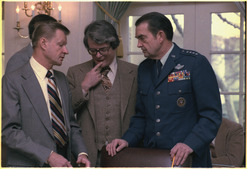
President Carter chose Brzezinski as his National Security Advisor because he wanted an intelligent person to give him daily advice on foreign policy. Brzezinski oversaw a new structure for the National Security Council (NSC).
- NSC Changes: Carter reduced the NSC staff and committees. Brzezinski chaired one of the two main committees, the Special Coordinating Committee (SCC). This was to prevent the NSC from becoming too powerful, as it had been under Henry Kissinger.
- Informal Meetings: Carter preferred informal meetings, like his Friday breakfasts, to make decisions. Brzezinski kept detailed notes of his own meetings with other officials. He also sent weekly reports to the President, who often wrote his own thoughts on them.
- Expanding Influence: Brzezinski's role grew during Carter's presidency. He became a special representative for the President. For example, he went to Beijing in 1978 to prepare for normalizing relations with China.
- Public Figure: Like Kissinger, Brzezinski had his own press spokesperson. His frequent TV appearances made him a well-known public figure.
- Afghanistan and Iran: The Soviet invasion of Afghanistan in 1979 further strained the relationship between Vance and Brzezinski. Vance believed Brzezinski's policies made the Soviets intervene. Brzezinski, however, said he tried to keep Afghanistan independent. The Iranian Revolution also caused deep disagreements. Brzezinski wanted military action to prevent Ayatollah Khomeini from taking power. Vance wanted to work with the new Iranian government. This disagreement led to Vance's resignation after a failed mission to rescue American hostages in Iran.
Key Policies and Ideas
- Peaceful Engagement: In the 1960s, Brzezinski developed the idea of "peaceful engagement" to weaken the Soviet bloc. He convinced President Johnson to adopt this as U.S. strategy in 1966.
- Trilateral Commission: In the 1970s, he helped form the Trilateral Commission. This group aimed to strengthen ties between the U.S., Japan, and Europe. He believed this cooperation would help them stand together against the communist world.
- Human Rights: While in the White House, Brzezinski strongly emphasized human rights. He believed this would put the Soviet Union on the defensive. He said it would show the world the weaknesses of the Soviet system.
- Middle East Peace: He helped President Carter achieve the Egypt–Israel peace treaty at Camp David.
- Supporting Resistance: He actively supported the Solidarity movement in Poland. He also provided secret support for the Afghan resistance against the Soviet invasion. He played a key role in normalizing U.S. relations with China.
- Post-Soviet Era: In the 1990s, he argued for supporting an independent Ukraine. He believed this would prevent Russia from becoming a large empire again. He also pushed for the expansion of NATO to include countries like the Baltic states.
- Pipelines and Foundations: He served as an envoy for President Bill Clinton to Azerbaijan to promote an oil pipeline. He also helped raise money for the Polish-American Freedom Foundation.
Afghanistan and the "Afghan Trap"
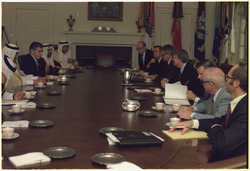
In April 1978, communists took power in Afghanistan. The new government signed a treaty with the Soviet Union. Their harsh rule led to a rebellion by mujahideen fighters.
In December 1979, the Soviet Union invaded Afghanistan. President Carter was surprised by this. The invasion was seen as a threat to global security and oil supplies.
- U.S. Response: Carter decided to respond strongly. He announced sanctions on the Soviet Union. He promised aid to Pakistan and committed the U.S. to defend the Persian Gulf.
- Arming the Mujahideen: Carter started a program to arm the mujahideen through Pakistan. Saudi Arabia also promised to match U.S. funding. This support increased under President Ronald Reagan. The Soviets eventually withdrew from Afghanistan in 1989. This helped lead to the collapse of the Soviet Union.
- "Afghan Trap" Theory: After the September 11 attacks, some people claimed Brzezinski intentionally provoked the Soviet invasion. This idea is called the "Afghan Trap" theory. However, many historians and former officials say this theory is incorrect. They argue that U.S. support for the mujahideen was small at first. It was a response to growing Soviet influence, not a way to trick them into invading. Brzezinski himself denied these claims.
Iran and the Hostage Crisis
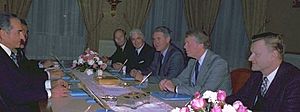
In November 1979, students in Iran stormed the U.S. Embassy and took American diplomats hostage. This started the Iran hostage crisis. Brzezinski disagreed with Secretary of State Vance's diplomatic solutions. He believed they would give Iran to the Soviets.
- Operation Eagle Claw: In April 1980, Brzezinski authorized a military mission called Operation Eagle Claw. Its goal was to rescue the hostages in Tehran. Vance was not informed about this plan. The operation failed when helicopters crashed in the desert, killing eight servicemen. Vance resigned because of this.
- Hostage Release: The hostages were finally released on the day Ronald Reagan became president, after 444 days.
- Shah's Admission: Brzezinski, along with Kissinger and David Rockefeller, helped convince Carter to allow the exiled Shah of Iran into the U.S.
Relations with China
Soon after Carter became president in 1977, he confirmed the U.S. position on China. In May 1978, Brzezinski traveled to Beijing. He started talks that led to full diplomatic relations between the U.S. and the People's Republic of China in January 1979. This meant the U.S. ended its official ties with Taiwan.
- Cold War Impact: This new relationship with China was very important for the Cold War. China was no longer seen as part of a Soviet-led group. Instead, it became a separate power, helping the U.S. against the Soviet Union.
- Taiwan Relations Act: The U.S. recognized that there was "one China" and that Taiwan was part of it. However, the Taiwan Relations Act allowed the U.S. to continue unofficial contacts with Taiwan. The Carter administration also agreed to end a defense treaty with Taiwan and reduce arms sales.
Ending Soviet Détente
President Carter's early policies showed a shift away from "détente," a period of relaxed tensions with the Soviet Union. Brzezinski played a big part in this change. He was a liberal Democrat but also a strong anti-communist. He believed in social justice but saw world events through the lens of the Cold War.
Brzezinski thought that promoting human rights could put the Soviet Union on the defensive. He believed this would highlight the weaknesses of the Soviet system. His policy on Iran was also linked to the Soviet Union. He saw Soviet influence growing towards the Persian Gulf. This led to the Carter Doctrine, which committed the U.S. to defend the Gulf.
Nuclear Strategy
Presidential Directive 59, signed during Carter's term, changed how the U.S. would target nuclear weapons at the Soviet Union. This directive, supported by Defense Secretary Harold Brown, set the U.S. on a new "countervailing strategy."
Arms Control
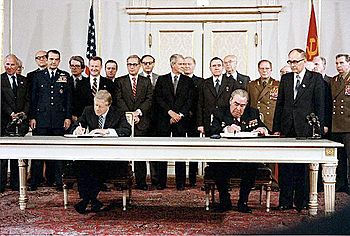
After Leaving Office
After leaving his government role, Brzezinski returned to teaching. He remained an important voice in international relations. Many Poles saw him as "our statesman" because he spoke for a free Poland during the Cold War.
- Views on Reagan: He had mixed feelings about the Reagan administration. He supported it as an alternative to what he saw as the Democrats' peaceful approach. But he also criticized it for seeing foreign policy in overly simple terms.
- Predicting Soviet Collapse: By the 1980s, Brzezinski believed the Soviet Union was heading for its end. In 1988, he published The Grand Failure, predicting the collapse of communism. He thought the Soviet Union would likely face a long crisis, but he also considered the possibility of its total collapse.
- Poland and the Berlin Wall: In 1989, the Communist party lost elections in Poland, and the Solidarity movement won. Later that year, Brzezinski visited Russia. He asked the Soviet government to admit the truth about the Katyn Massacre, which received a standing ovation. Ten days later, the Berlin Wall fell.
- Post-Cold War Warnings: In 1990, Brzezinski warned against being too optimistic after the Cold War. He opposed the Gulf War. He argued it would waste the international goodwill the U.S. had gained and cause anger in the Arab world.
- NATO Expansion: He was a strong supporter of NATO expansion. He believed that without Ukraine, Russia could not be a big empire. He also supported the 1999 NATO bombing of Serbia during the Kosovo war.
Later Years and Legacy
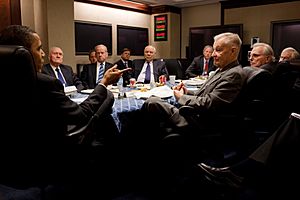
Brzezinski continued to be an influential voice after his time as National Security Advisor. He often avoided party politics.
- Iraq War Opposition: He strongly argued against the 2003 invasion of Iraq. He was one of the few who believed it would be a mistake. Later, he called President George W. Bush's foreign policy "catastrophic."
- Critic of War on Terror: He was a leading critic of the Bush administration's handling of the War on Terror. He believed their actions after 9/11 damaged America's reputation.
- Supporting Obama: In 2007, Brzezinski supported Barack Obama for president. He said Obama understood that the world was changing and America needed a new approach.
- Ukraine and Trump: In 2014, he wrote an article about Russia's actions in Ukraine. He compared Russian President Vladimir Putin's actions to those of Adolf Hitler. He was also very concerned about the election of Donald Trump as president.
- Final Thoughts: On May 4, 2017, he sent his last Tweet. He said that strong U.S. leadership was essential for a stable world.
Family Life
Brzezinski was married to Emilie Benes, a Czech-American sculptor. They had three children.
- His younger son, Mark Brzezinski, is a lawyer. He served as the U.S. ambassador to Sweden and later to Poland.
- His daughter, Mika Brzezinski, is a well-known television news host. She co-hosts the show Morning Joe.
- His elder son, Ian Brzezinski, is an expert in foreign policy. He worked for the Department of Defense.
Public Roles
Brzezinski was a member of several important organizations. These included the Atlantic Council and the National Endowment for Democracy. At the time of his death, he was a member of the Council on Foreign Relations.
He was often called by his nickname, "Zbig."
Film Appearances
Brzezinski appeared as himself in several documentaries and TV series. These included the 1998 CNN series Cold War. He was also portrayed by an actor in the 2014 Polish film Jack Strong.
Death
Brzezinski died on May 26, 2017, at the age of 89. His funeral was held in Washington, D.C. Former President Jimmy Carter and former Secretary of State Madeleine Albright gave speeches. Many important diplomats, journalists, and officials attended.
President Carter said that if he could choose a seatmate on Air Force One, it would be Brzezinski. Former National Security Advisor Henry Kissinger sent a note that was read at the funeral. It said, "The world is an emptier place without Zbig pushing the limits of his insights."
Honors and Awards
 Presidential Medal of Freedom, 1981
Presidential Medal of Freedom, 1981 Grand Cross of the Order of Tomáš Garrigue Masaryk, 1998
Grand Cross of the Order of Tomáš Garrigue Masaryk, 1998 Order of the White Eagle, 1995
Order of the White Eagle, 1995 Honorary citizenship of the City of Gdańsk, 2002
Honorary citizenship of the City of Gdańsk, 2002 Grand Officer of the Order of the Three Stars, 2007
Grand Officer of the Order of the Three Stars, 2007
Honorary Degrees
| Location | Date | School | Degree |
|---|---|---|---|
| 1979 | Fordham University | Doctorate | |
| June 9, 1986 | Williams College | Doctor of Law (LL.D) | |
| 1990 | John Paul II Catholic University of Lublin | Doctorate | |
| 1998 | Vilnius University | Doctorate | |
| November 7, 2003 | Baku State University | Doctorate |
Books by Brzezinski
- The Permanent Purge: Politics in Soviet Totalitarianism. Cambridge: Harvard University Press, 1956.
- Soviet Bloc: Unity and Conflict. Cambridge: Harvard University Press, 1967.
- Between Two Ages: America's Role in the Technetronic Era. New York: Viking Press, 1970.
- Power and Principle: Memoirs of the National Security Adviser, 1977–1981. New York: Farrar, Straus, Giroux, 1983.
- Game Plan: A Geostrategic Framework for the Conduct of the U.S.-Soviet Contest. Boston: Atlantic Monthly Press, 1986.
- Grand Failure: The Birth and Death of Communism in the Twentieth Century. New York: Collier Books, 1990.
- Out of Control: Global Turmoil on the Eve of the 21st Century. New York: Collier Books, 1993.
- The Grand Chessboard: American Primacy and Its Geostrategic Imperatives. New York: Basic Books, 1997.
- The Choice: Global Domination or Global Leadership. New York: Basic Books, 2004.
- Second Chance: Three Presidents and the Crisis of American Superpower. New York: Basic Books, 2007.
- America and the World: Conversations on the Future of American Foreign Policy. New York: Basic Books, 2008.
- Strategic Vision: America and the Crisis of Global Power. New York: Basic Books, 2012.
See also
 In Spanish: Zbigniew Brzezinski para niños
In Spanish: Zbigniew Brzezinski para niños
 | William Lucy |
 | Charles Hayes |
 | Cleveland Robinson |


